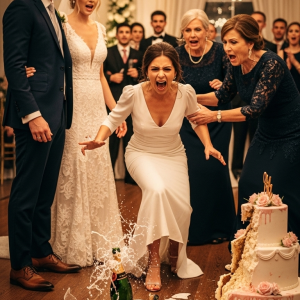I’ve been a lurker on Reddit for years, but I never thought I’d post. The last two days, however, have been insane. I need to get this off my chest.
My parents split when I was nine. My dad was never great with money, but he tried his best. My mom, however, was obsessed with status. When I was eleven, she married Frederick, a man who owned a few local businesses and had money. We moved into his mansion with his kids, Everly and Oscar. From day one, my little sister Catalina and I were treated like unwanted baggage. Frederick would “joke” about how much extra we cost him, or how our rooms could have been a home theater. His kids got new phones while we were told to be grateful for a roof over our heads. Mom just went along with it, telling us to stop being so sensitive.
The turning point came when I was fifteen. Frederick called an “emergency family meeting” in the garage on a sweltering Sunday afternoon. I still remember the heat, my faded green t-shirt, Catalina’s little braids. He had set up six folding chairs in a semicircle in front of a whiteboard with our names on it. Beside it was a homemade cardboard wheel with four names: mine, Catalina’s, Everly’s, and Oscar’s. Mom stood by with cue cards, looking nervous but excited.
Frederick began with a sickening game show host routine. “Welcome to Who Stays, Who Goes?” he boomed, “the show where we determine which lucky contestants get to remain part of this family!”
I thought it was a twisted joke until I saw the suitcases packed behind him. Mom read from her cards, her voice a fake, cheerful monotone, about how blended families often fail because stepchildren create too much tension. Catalina grabbed my hand and whispered, “Is this real?”
Frederick heard her. “Oh, it’s very real. Today, two lucky contestants get to stay, and two get to go.” He had his kids emerge with party poppers. He spun the wheel. It landed on the line between me and Catalina.
“Oh my goodness!” he feigned shock. “For the first time in show history, we have two losers in one spin!” His children cheered and high-fived. Frederick announced we had thirty minutes to pack and were no longer welcome in his house.
Mom handed each of us a black garbage bag. “Suitcases are for family members,” she said, her voice chillingly calm. “These are for guests who’ve overstayed their welcome.”
I was in shock, but Catalina’s crying snapped me out of it. I got in Frederick’s face, telling him he couldn’t do this. He shoved me backward. “If you’re not out in thirty minutes, I’ll call the cops for trespassing.”
I looked at my mother, pleading with my eyes. She just handed me a printed sheet with my dad’s address. “I’ve already called him. He’s expecting you.”
The worst part? Frederick made us hand over our house keys and recorded us on his phone, forcing us to state that we were leaving voluntarily. When I refused, he grabbed my arm and twisted until I complied. While we packed, Everly and Oscar came into our rooms, taking “souvenirs.” Everly took Catalina’s collection of crystals. Oscar grabbed my gaming headset. “Winners get the spoils,” Frederick said with a grin.
We shoved what we could into those garbage bags. Mom stood in the doorway, calling out the time like a countdown. Dad was waiting in his beat-up Corolla. Frederick and his kids stood on the porch, drinking champagne and taking photos of us walking to Dad’s car. Dad looked like he wanted to kill someone, but I shook my head. We just needed to get Catalina out of there.
Frederick had been planning it for months, telling neighbors and school staff that we were “troubled kids” so he could control the narrative when we disappeared. The first few months with Dad were rough. We lived in his one-bedroom apartment, Catalina and I sharing the room while he slept on the couch. He picked up extra shifts and found a lawyer to try and get our belongings back, but it was no use. Frederick had the recordings of us “willingly” leaving. Mom backed his story.
The worst part was watching Catalina fall apart. She went from a bright, chatty kid to barely speaking, plagued by nightmares. Mom saw her maybe once every couple of months, always in public, never at home.
I graduated high school and worked my way through state college, helping Dad with rent. Dad passed away last year from a heart attack. He was only 49. He’d worked himself to death for us.
Going through his papers two weeks ago, I found it. The key. The house he and Mom owned before the divorce—the one they sold to put a down payment on the mansion—was never properly transferred out of his name. The lawyer had messed up the paperwork. Dad still technically owned 50% of that original house value. And as his sole heir, I inherited his claim.
I started digging. Frederick’s “successful” businesses were struggling. The mansion was mortgaged to the hilt. And, most critically, he had used the equity from that original house—the one Dad partially owned—as collateral for his failing business loans. He had committed fraud.
I found a good lawyer this time. We confirmed everything. Two days ago, we pulled the trigger, sending official letters to the banks, his business partners, and the county property assessor, notifying them that a significant portion of his collateral was based on fraudulently obtained property.
That’s when my phone blew up. Frantic messages from Mom. Twenty-seven missed calls in an hour from Frederick, his voicemails shifting from threats to desperate pleas to “talk this out like men.”
I haven’t responded. I’ve waited twelve years for this moment. Catalina is beside me, stronger every day. We’re watching their lives implode in real time. And this is just the beginning.
After I sent those letters, things moved fast. I learned more from Frederick’s estranged daughter from his first marriage, Michaela. He had a pattern of “trading up” wives and discarding children who didn’t fit his narrative. She confirmed his businesses were a house of cards, propped up by loans he had no right to secure. The deed from Dad’s house? Frederick had forged Dad’s signature.
Two days after the letters went out, they showed up at my apartment, pounding on the door at 10 p.m. I saw Mom crying and Frederick, red-faced, through the peephole. Catalina started having a panic attack. I called security, who escorted them out after Frederick tried to shove one of the guards. Mom screamed that I was destroying our family. The irony was rich.
The next day, Oscar, now 24, called. He said they’d been told we were caught stealing and had to go live with Dad as punishment. When I told him about the game show, he went completely silent, then said, “That explains a lot,” before hanging up. Everly, on the other hand, texted to call me a liar. I sent her a photo of the deed with Dad’s name on it. She blocked me.
The dominoes fell. A business partner called my lawyer. The bank started foreclosure proceedings on the mansion. Frederick’s line of credit was frozen. And Mom discovered they were six months behind on their mortgage at the same time she learned her husband was a fraud.
Last Friday, she cornered me at my workplace. She looked terrible, wearing sweatpants she used to call “trashy.” She started with tears, claiming Frederick made her do it, that he’d threatened to leave her with nothing. When she saw I was unmoved, her tone turned venomous. “You’re just like your father, holding grudges!”
I just looked at her. “Do you remember telling Catalina that suitcases are for family while handing her a trash bag?”
She slapped me. Hard. My coworker saw the whole thing and called security. I filed a police report, not because it hurt, but for the documentation.
Yesterday, I received a handwritten letter from Frederick. A rambling, self-pitying mess about how he was just trying to create a “cohesive family unit.” The kicker? He admitted the real reason he wanted us gone. Mom had once told him she’d leave him, just as she left our father, if he didn’t make her happy. He was terrified of losing his money in a divorce. So he decided to remove us—the reminders of her previous life and her willingness to leave. He engineered the game show to get rid of the competition. I showed the letter to my lawyer, who called it a “gold mine of admissions.”
This morning, I got word that the bank is accelerating the foreclosure. They have 60 days to pay over $750,000 or get out. And I haven’t even played my biggest card yet. Catalina thinks we’ve done enough. But then I remember her crying in Dad’s car while Frederick and his kids drank champagne and laughed. No, this isn’t over.
The final card was a gift from my dad. He had kept meticulous records, including a recorded phone call with Frederick from two months after we were kicked out. On the tape, Frederick admitted the whole eviction was planned to get rid of “the baggage” and even laughed about the game show format.
I sent the recording to Frederick’s three biggest business partners. Within 24 hours, they had all pulled out. That night, a rock came through my apartment window.
The next bombshell came from a tenant in one of Frederick’s rental properties, revealing serious code violations. I forwarded the evidence to the county housing authority. Frederick was hit with over $50,000 in fines and repair orders.
My Aunt Debbie, Mom’s sister, finally heard the full story and confronted my mother, who had a public breakdown in a Starbucks. She admitted she knew it was wrong but was scared Frederick would leave her.
The next day, she came to my apartment, looking defeated. She confessed everything. How Frederick controlled her, punished her for trying to contact us, and convinced her a prenup would leave her with nothing. I almost felt sorry for her, until she started talking about how hard it had been for her. I told her to leave.
The legal proceedings moved quickly. To avoid a longer sentence, Frederick took a plea deal: three years in prison plus probation and massive fines for tax evasion and fraud. Mom got probation and community service. She’s living with Aunt Debbie, working at a grocery store.
The most satisfying moment came when Catalina confronted Frederick at a Denny’s near his motel. He looked like a ghost. She looked him dead in the eyes. “Why did you hate us so much?”
He admitted that his own stepfather had abused him, and seeing us reminded him of his own past weakness. He chose to become the abuser to feel powerful.
Catalina listened, then stood up. “I came here thinking I needed your apology to heal. I don’t. You’re a weak, pathetic man who hurts children to feel strong. I’m not like you. And that’s all the closure I need.” She walked out with her head held high. I left a 40-cent tip on the table, a petty callback to a time he’d “generously” given me that amount for getting straight A’s.
With the settlement from Dad’s share of the original house, I paid off Catalina’s student loans and put a down payment on a house. The same one Mom and Dad owned when I was a kid. It came back on the market, and I knew it was meant to be.
Catalina comes over for dinner every Sunday. We’re slowly replacing the childhood memories we lost with new ones. Frederick went to prison last month. Mom calls, asking for reconciliation. I’m not there yet.
The best revenge wasn’t watching them lose everything. It was watching my little sister reclaim herself, free of the power they held over her. That’s worth more than all the houses and money in the world. Dad would be proud. That day in the garage, I whispered to Catalina that we’d survive and someday make them pay. Promise kept, little sis. Promise kept.
When I got home, the house smelled like fresh basil and garlic. Catalina was in the kitchen, stirring pasta, humming off-key. On the table sat a stack of mail. On top: an envelope in Frederick’s blocky handwriting.
“Guess who wrote again,” I said.
“If it’s Mom, toss it. If it’s Frederick, read it so I can laugh.”
I opened it. Same mix of whining and threats, but one line stood out: You made your point. You won. Now stop.
Catalina smirked. “He still thinks this is a game. Read him the new rules—there’s no next round.”
I asked if Everly had contacted her again. Catalina’s mouth tightened. “She says she grew up thinking we were sent to Dad’s for stealing. I told her the only thing we stole was our freedom.”
We both knew what we had to do. Catalina brought out Dad’s old binder and the USB drive with the audio. “Let’s tell the whole story,” she said. “Not to ruin them—just to warn others.”
The documentary—Black Bags—was blunt, unflinching. Catalina’s voiceover: “This is the story of how our stepfather made a game out of throwing children out of their home.” The audio clip of Frederick’s voice—Two losers in one spin!—hit like a punch. The internet found the rest. Public records. Photos of the abandoned mansion. His first family. The story spread.
That’s when Mom and Frederick came to our door late one night.
He stepped forward first. “We need to talk.”
“No,” I said. “You need to listen.”
Mom’s voice shook. “Sweetheart, I was scared—he said he’d leave me with nothing.”
Catalina came into the hall. “You chose your comfort over our safety. That’s what happened.”
Frederick’s jaw clenched. “You’re slandering me to the whole world.”
“That’s only slander if it’s false,” I said, pulling out my phone. I hit play on the recording. His voice filled the doorway, booming, Who Stays, Who Goes? Mom’s fake-cheer script. Catalina’s small, scared voice. And then—Two losers!
His face drained of color. “Turn that off—”
“I hope the whole street hears it,” I said.
Mom reached toward me but stopped. “I live with this every day.”
“Good,” Catalina said flatly. “You should.”
Frederick leaned closer. “You think you’ve won? This isn’t over.”
“It is,” I told him. “You start this again, you’ll be back in prison.”
They left. The next morning, an envelope sat on my windshield—an old photo of me as a kid in the living room. On the back, in Frederick’s neat print: You should have stayed quiet.
We went straight to our lawyer. Filed for a permanent no-contact order, handed over everything—the photo, the texts, the audio, the trailer. The judge didn’t hesitate.
Frederick’s parole officer called it a “stunning mistake.” He was taken back into custody. But the hearing still happened.
The courtroom smelled of disinfectant. Mom sat twisting a tissue. Frederick shuffled in, smaller in a tan jumpsuit.
I described the garage that day: the heat, the wheel, the countdown. Catalina spoke slowly, each word steady: “He spun. He laughed. He called us losers. My mother handed me a trash bag.”
Frederick’s lawyer tried to soften it. “My client comes from trauma—”
“Context doesn’t change cruelty,” our lawyer replied, then played the audio. The judge flinched at the laughter.
Frederick asked to speak. “I was scared. My stepfather—”
Catalina cut in. “You could’ve chosen to be better. You chose to be the man you hated.”
The judge invited her to give a statement. Catalina stood. “I thought forgiveness was the key. But I don’t owe him my peace. I owe the child I was safety, and I owe kids like me a warning. He doesn’t get to be the author anymore.”
The judge signed the order. “Permanent. Enforceable statewide. This was never a game, Mr. H—.”
Outside, Mom found us. “I want to fix it,” she said.
“With what?” Catalina asked. “A time machine?”
“With the rest of my life,” Mom said quietly. “It won’t be enough. But I’ll spend it anyway.”
“Then spend it on kids who aren’t yours,” Catalina said. “That would be a start.”
After that, a streaming service picked up Black Bags. We started the Black Bag Project—emergency aid and legal help for kids thrown out of their homes. Everly mailed a small box with no note. Inside: Catalina’s chipped quartz crystal. She held it up to the light until it scattered rainbows.
“Still beautiful,” she said. “Even broken.”
I visited Dad’s grave and left a copy of the deed to our house. She’s safe. I am too, I wrote.
That night, Catalina and I sat on the porch. “Do you think it’s over?” she asked.
“No,” I said. “But it’s ours now.”
She leaned her shoulder into mine. “That’s enough.”




